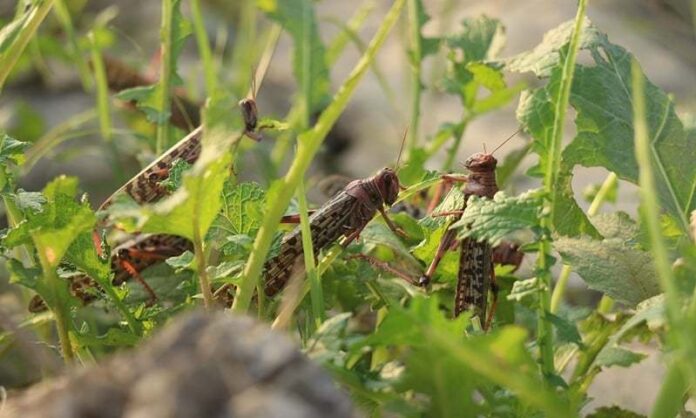The government declared on Wednesday that efforts are under way to clear locust from Baluchistan and the Sindh provinces, while officially declaring Punjab and the Khyber-Pakhtunkhwa districts free of locust regions.
As per the spokesperson for the National Locust Control Center (NLCC), over the past six months, the federal government, in cooperation with provincial departments, carried out anti-locust operations on 1,126,619 hectares of land and avoided the threats of pests that had threatened 61 districts in four provinces.
Anti-locust survey and control operations were ongoing as about 212,797 hectares were surveyed in the last 24 hours, while control operations were carried out on 600 hectares of Baluchistan District Lasbella and 320 hectares of Sindh.
As per the agricultural experts, locust posed a more severe threat to Pakistan than coronavirus, as the attack occurred at a time when most crops such as cotton, paddy, maize, fodder, and vegetables were in their initial stages.
Though hailing the National Disaster Management Authority (NDMA) and the NLCC in dealing with the locust situation, the farming community said collective losses to the agriculture economy would have crossed the Rs800 billion mark as it posed a serious threat not only to paddy, maize, sugarcane, fruit, cotton, vegetable crops but also to animal feed crops.
Mughal and Khokhar said that locust attacks over the past six months could not cause serious crop damage due to hot weather conditions, but authorities have to take appropriate measures to deal with the situation during the month of September and next month of October.
Citing a recent USAID survey, Mughal said the survey had put estimated losses on agriculture at $4.5 billion if the issue was not dealt with in a timely manner. Currently, most of the Kharif crops are in the initial stages, and this is the best time to treat the locust, once the crops begin to grow, the locust may strike as it prefers juicy leaves and becomes incurable.
Ibrahim Mughal said that the recent past attack on the locust could have caused up to Rs15 billions of financial losses to the agriculture sector, mainly in the province of Baluchistan, which was worst affected, while damage in other parts of the country was not severe.
While appreciating the efforts of the federal and provincial governments to deal with locust, Khokhar said dealing with locust is a national cause and should be, above all, a political one.



